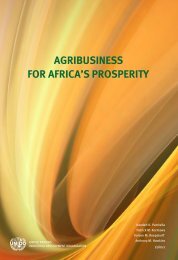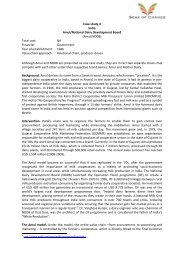Collection of Case Studies 2. - Seas of Change Initiative
Collection of Case Studies 2. - Seas of Change Initiative
Collection of Case Studies 2. - Seas of Change Initiative
You also want an ePaper? Increase the reach of your titles
YUMPU automatically turns print PDFs into web optimized ePapers that Google loves.
Appendix 1: Overview chain actorsProducersThe members <strong>of</strong> FAPECAFES are identified as small organised farmers <strong>of</strong> Zamora Chinchipe, which producemostly c<strong>of</strong>fee and plantain. A study <strong>of</strong> VECO Andino showed that:- 52% <strong>of</strong> the farmers’ income comes from c<strong>of</strong>fee sales and 22% from the selling <strong>of</strong> plantains (by farmersthemselves) and chips (through FAPECAFES);- the access to food is not that difficult in this region. Most <strong>of</strong> the farmers have a guaranteed access tobasic products;- respectively 70 and 60% <strong>of</strong> the male and female farmers went to primary school, whereas none <strong>of</strong> thefemale respondents finished secondary school.- both men and women participate in the cultivation <strong>of</strong> plantains- there is a low level <strong>of</strong> participation <strong>of</strong> the youth in production activities.Organisations <strong>of</strong> the producersThe organised family farmers <strong>of</strong> Zamora Chinchipe that produce c<strong>of</strong>fee are all member <strong>of</strong> 1 <strong>of</strong> the 3 farmers’organisations <strong>of</strong> that province: APECAP, APEOSAE and ACRIM. Of the 721 farmers that were member <strong>of</strong> thesethree organisations in 2010, 140 are directly involved in the program with VECO.FAPECAFES, a federation <strong>of</strong> c<strong>of</strong>fee farmers in the south <strong>of</strong> Ecuador, was established in 2001 and quicklygathered some 1,500 farmers from 3 provinces, with the aim <strong>of</strong> producing on a yearly basis some 500 tons <strong>of</strong>c<strong>of</strong>fee and exporting it to Europe and the United States. Currently, 7 grass roots organisations (such as APECAP,APEOSAE and ACRIM) are member <strong>of</strong> FAPECAFES, with a membership at present <strong>of</strong> over 2000 c<strong>of</strong>fee farmers, <strong>of</strong>which 600 also cultivate plantain.CollectorsThe bananas are collected in storage facilities (owned by the farmer’s associations) before being transported toprocessing plants. The collection and storage facilities are inadequate to meet the supply <strong>of</strong> the farmers, causingdelays that affect the quality <strong>of</strong> the plantains (<strong>of</strong>ten going to waste).ProcessorsThe main processing actors in Ecuador involved in the export <strong>of</strong> plantains or its derivatives are in order <strong>of</strong>relevance: Banchis, Exotic blends, ECOFRUT S.A., Frito Lays and Inalproces. There is also NutriCorp SA and SanLucas International Ltd. FAPECAFES has a trade agreement with ECOFRUT S.A. for processing the plantain fruit.Once the process is finished, FAPECAFES is responsible for transporting the chips to the seaport, from where itsend to the final market: France .Wholesalers and RetailNational and International marketsEthiquable is the biggest importer <strong>of</strong> fair trade products in France, including bananas, c<strong>of</strong>fee and chips.Local marketsUnder the APECAP umbrella there are 15 small distributors <strong>of</strong> plantain for local market, where-as APEOSAE has27 small and 5 big distributors among its bases. FAPECAFES establishes the commercial agreements betweencompanies (like ECOFRUT) and the harbour <strong>of</strong> Guayaquil.ConsumersWhile domestic consumers do not attach any further rationale behind their consumption, interna-tional consumersseek to buy quality products to support fair trade farmers. The end-markets where they buy their food productsare increasingly developing traceability standards to make sure that the food they sell complies with food safetystandards. As such, FAPECAFES does not have any market-related research to the pr<strong>of</strong>ile <strong>of</strong> consumers <strong>of</strong>plantain chips or the international demand for it.Chain supportersThere are several bodies involved in the support <strong>of</strong> the chain, be it with technical assistance and research (e.g.COFENAC, GTZ), financing and credit mechanisms (e.g. VECO Andino, BNF (National Bank <strong>of</strong> Procurement) orenvironmental protection (Ministry <strong>of</strong> Environment). The main ones are:« VECO Andino, a Belgian NGO that seeks to improve farmers living conditions through the improvement <strong>of</strong>production chains, provides financial support for chain studies, among others.60







